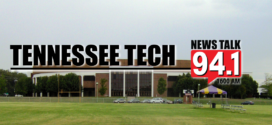The Cookeville Planning Commission voted Monday night to rezone 59 acres of land along Spring Street and Interstate 40 to quarry and mining.
Planning Director Jon Ward called it the best way to control the future of the land in question. The rezoning, from general commercial, does not include 600 feet along Spring Street, an effort to provide a buffer to the quarry.
Developers want to remove the rock from the area to ultimately create a new commercial area at the exchange.
“Our ultimate goal is to create this to be a flat, commercially-developed place,” Owner Barry Reese said. “We’re not going deep. We’re trying to get this done as fast as possible.”
But Reese drew fire from residents and members of the planning commission. Ward said the owners failed to answer a cease-and-desist letter from the city after staff discovered the company was processing rock inside the city limits, a violation of the city zoning code. Ward said at a June 26 meeting with staff and City Manager James Mills, owners said they had no intentions of stopping, but did plan to submit a rezoning plan.
“We were just trying to see if it was going to be economically-sensible to make this happen in this manner,” Reese said.
Reese said a lengthy meeting followed outlining options available to the owners.
“I still don’t understand why you didn’t stop,” Planning Commission Member Leslie Draper said. “Cease and desist, I thought that’s what it means.”
The owners have also purchased a one-acre and four-acre tract just above the quarry that lie outside the Cookeville city limits. The company can use this land to process the rock and soil on the site by simply trucking the materials to the area at the top of the wall. The county has no zoning codes in place.
“The crushing will continue and it will be a whole lot worse for everybody if we go up to that extra piece,” Reese said. “And we don’t want to do that.”
Ward said he believes working in the pit will be less impactful to the community.
Planning Commission Member Eric Walker said the city is being held hostage, something Walker said is sad.
“You don’t go out and start building a shopping center before you ask to have the property rezoned,” Walker said. “You don’t do certain things and break the zoning code. The idea that this quarry is going to happen no matter whether we zone it or not and it’s to our best benefit to try and mitigate it as much as possible.”
Residents complained of blasting in the area that has caused damage to homes and businesses.
“As property owners, as business owners, we feel like we’re being destroyed,” Resident Elaina Morgan said. “Some of these are so strong in nature they will knock whatever you have on the wall, off.”
“The thing that bothers me is the blasting,” Resident Bobby Bradley said. “You can blast or do whatever, it’s on your property. I’ve had a lot of damage.”
Ward said the city cannot limit blasting on the site beyond just limits on the time of day it can happen, because it is a legitimate way to clear land. Blasting is controlled by the State Fire Marshall’s office. Reese said other quarries that sit just outside the city limits do more blasting than his property.
Multiple quarry operations are located on Dacco Quarry Road, in the area along Interstate 40. The Putnam County Convenience Center is also located in this area.
The planning department recommended the rezoning of the property. Ward said by rezoning the land, the city could control the reclamation of the land with erosion control, grading, and plantings once the quarry work is complete. The reclamation process includes six-month and 12-month deadlines to make the land acceptable.
Ward said estimates are it will take seven years to remove all the debris from the site.
The area operated as a quarry during the late 1950s during the construction of Interstate 40. Ward said that discontinued in the 1960s. The current owners purchased the land and began sending rock to local providers. They stopped when the rock included too much debris, thus, the “cleaning” process implemented on the site. The company uses machinery to screen the rock, a violation of the city zoning code.
 News Talk 94.1/AM 1600 Where The Upper Cumberland Talks
News Talk 94.1/AM 1600 Where The Upper Cumberland Talks







